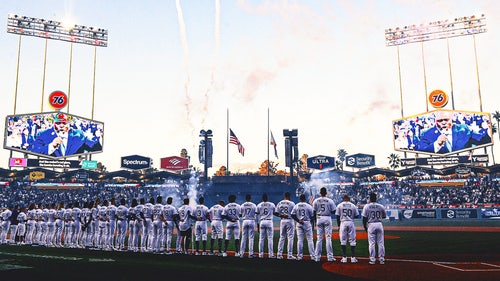
More wild cards won't make playoffs fair
Check the standings. Suddenly expanded playoffs don’t look like such a hot idea.
The Braves lead the National League wild-card race by 9-1/2 games. The Yankees lead the AL race by eight.
And if a second wild card qualified from each league?
In the NL, the injury-depleted Giants would lead the rapidly fading Cardinals by one game and the long-irrelevant Reds by 4-1/2.
In the AL, the contenders would be more presentable: The Angels would lead the Rays by a half-game and the Blue Jays by five, with the Indians and White Sox further back.
For now, the entire discussion is on hold; the players’ union wants expanded playoffs tied to realignment and a more equitable interleague schedule. The owners, however, do not appear ready to create two 15-team leagues, at least not by 2012.
Evening out the leagues and divisions should be baseball's top priority, though finding the right club to switch leagues is problematic.
I’m not in love with a central premise of the expanded playoffs, which is to penalize the wild card by adding another wild card. But I’m OK with going from 8 to 10 teams if the union’s conditions are met.
Grudgingly OK.
Frankly, the way the current season is playing out should give everyone pause. If you think the world suddenly will be fair under the new format, think again.
Let's start with the Braves, who own the second-best record in the NL.
The Braves clearly are superior to the Giants, Cardinals and any other NL club that might pose a late threat. Yet, in an expanded postseason, they would play a clearly inferior opponent in the first round, be it in a one-game, wild-card playoff or a best-of-3.
How would that be fair? Or even logical?
Now let’s go to the AL, where the case for an expanded format seemingly is stronger. The Yankees-Red Sox race in the AL East would be an actual race under the expanded format, and not just a question of which team wins the division and which wins the wild card.
Can’t argue with that — and yes, a division title should mean more than it does under the present system. But let’s say the Yankees and Red Sox battled it out for the East until the final day of the season, while the Angels, Rays or some other club wound up with a comfortable cushion for the second wild card.
That club could line up its rotation and rest its bullpen, gaining a huge advantage over a team that it trailed by a significant margin! The Yankees and Red Sox, meanwhile, would burn their best pitchers trying to avoid the wild-card round, particularly if it was a one-shot deal.
Not fair. Not logical. Not something to which baseball should aspire, that’s for sure.
Admittedly, we’re talking about a worst-case scenario — and only one season, the smallest possible sample. In other years, the second wild card could help produce mad scrambles in multiple races, generating precisely the kind of excitement that baseball craves. We all would grow accustomed to the new dynamics, just as we grew accustomed to them after baseball first adopted the wild card in 1995.
For a team such as this year’s Braves — a first-place wild card with a decidedly better record than the second-place wild card — the solution would be simple.
Win your division.
Win your division, and avoid the wild-card round entirely.
If you think about it, the wild card actually is a privilege — a privilege awarded to a team that finishes second after 162 games or, in the case of expanded playoffs, maybe even as low as third.
The counterpoint, though, is this: If baseball wants to punish its final postseason qualifiers to near-extremes, then why even bother including such teams at all?
As Joe Posnanski recently pointed out on his blog, the expanded format could hinder as many races as it helps. Yankees-Red Sox this season would be better, but Giants-Diamondbacks and Rangers-Angels would be worse, with the additional wild card providing soft landing spots for the losers of both.
Heck, no format will be even remotely fair until baseball gives teams in each league the same mathematical chance of reaching the postseason. It’s patently absurd that one club in Texas, the Astros, must beat five teams to wins its division while the other, the Rangers, must beat only three.
I’m with the union — if baseball wants expanded playoffs, then balance the leagues, make every team in a division play the same interleague schedule and try to fix everything at once.
No system is perfect, but baseball is hereby warned: Be careful what you wish for.










